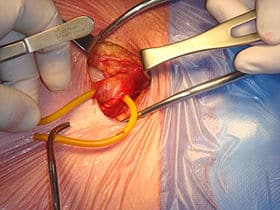Hernia refers to the abnormal exit of tissue or an organ through the wall of the cavity in which it normally resides, causing a bulge to be felt.
There are different types of hernia depending on the location. Some hernias include inguinal hernia, hiatus, incisional and umbilical hernias.
Most often than not, hernias tend to remain and usually do not go away without treatment. Hernia surgery may be required if the hernia is strangulated causing pain and discomfort
Causes of Hernia
A hernia may be due to a variety of causes. Some causes of hernia include:
Mechanical Causes: Some hernias may result from sheer mechanical factors such as incorrect posture, coughing bouts, and improper weight lifting.
Abdominal Cavity Pressure: Conditions that increase the pressure of the abdominal cavity may also cause hernias. They include obesity, chronic lung diseases, fluid in the abdominal cavity.
Weak Muscles: Hernia may result from weakened muscles due to poor nutrition, smoking and overexertion.
More: Rib Removal Surgery
Treatment of Hernia
Surgery is recommended for some types of hernias to prevent complications like obstruction of the bowel or strangulation of the tissue, although umbilical hernias and hiatus hernias may be watched, or are treated with medication. Most abdominal hernias can be surgically repaired, but surgery has complications. The time needed for recovery after treatment is reduced if hernias are operated on laparoscopically. However, open surgery can be done sometimes without general anesthesia.
Hernia Surgery Cost
The total cost for hernia surgery depends on a lot of factors such as the anesthetic fee, private hospital fee, private operating facility fee, location of hernia and insurance coverage.
Inguinal Hernia Surgery Cost

A recent study of more than 1.5 million hernia operations found that the average cost for an open hernia surgery ranged between $4,200 and $6,200.
Those with insurance can expect to pay typical deductibles and coinsurance rates. According to the Medical Expenditure Panel Survey conducted by the Agency for Healthcare Research and Quality, the average family will have a $939 deductible to meet each year before their insurance benefits cover procedures. In addition, the survey found that the average coinsurance rate is about 17.9 percent of the bill. This means the average patient would pay between $750 and $1,109 for their hernia surgery.
Femoral Hernia Surgery Cost
Femoral hernias sometimes appear as a painful lump in the inner upper part of the thigh or groin. The lump can often be pushed back in or disappear when you lie down.
Umbilical Hernia Surgery Cost
They involve protrusion of intra-abdominal contents through a weakness at the site of passage of the umbilical cord through the abdominal wall. Umbilical hernias in adults are largely acquired and are more frequent in obese or pregnant women. Abnormal decussation of fibers at the linea alba may contribute.
The cost for umbilical hernia repair is about $3,500 to $8,500.
Many of these hernia operations are done at hospitals, where the fees are very high. The average hospital bill for a routine hernia operation is $5,800 and that doesn’t include the hernia doctors’ bills. Many of our patients have been told that the cost at their local hospitals can be over $10,000!!
The high costs of the hernia surgery are then passed on to the insurance companies. If you are uninsured or have a high deductible, then you end up with a large bill. In addition, hospitals and doctors usually charge uninsured patients much higher fees than the insurance companies pay. It’s not fair, but that’s the way it usually is.
Another problem patients often face after receiving hernia treatment at the hospital is the unexpected bills that come afterward. It is often impossible to get an accurate estimate of the cost before hernia surgery, and so the true cost of repairing a hernia may not be known until weeks after the hernia operation.
More: Lipoma Removal Cost


